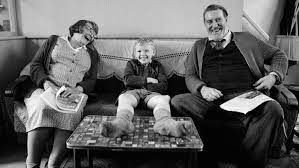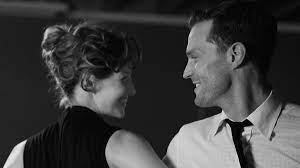"Too long a sacrifice can make a stone of the heart" - Pop
Kenneth Branagh's Belfast is a beautifully shot, wonderfully acted, and just the right side of schmaltzy movie. It's evocative of both a specific place and time (Belfast towards the end of the sixties) while, at the same time, telling a tale of childhood that is universal and understandable to anyone who's ever had, or ever been, a child.
It's a warm, warm watch even though some of the things that take place around the action are anything but warm. Nine year old Buddy (Jude Hill) lives with his Ma, Pa, and brother Will in a terraced house a little north of the centre of Belfast. It's a predominantly Protestant neighbourhood but the few Catholic families who live there have always been accepted as neighbours and friends.
Seen as being no different except for that they kick the ball with their left feet! Or at least that's how it used to be. Young Buddy is curious about the difference between Protestantism and Catholicism but, as a nine year old boy, he's far more interested in Star Trek, Thunderbirds, playing football, going to the cinema, and the cute and clever little girl at school, Catherine (Olive Tennant) whom he intends to marry when he grows up.
His family is a loving one but also one with its fair share of problems - most of them related to money (witness Ma hiding when the rent collector knocks round). At least until 'troubles' of a different form arrive. Ma (Caitriona Balfe) is a well dressed, beautiful woman and a loving mum who has lived in the area her whole life, knows everybody there, and can barely imagine a world beyond but Pa (Jamie Dornan) has been working on building sites in London and dreams of taking the family somewhere sunnier, and safer.
Somewhere like Sydney or Vancouver. Both places he brings brochures home for Ma and Buddy's elder brother Will (Lewis McAskie, somewhat underused) to peruse. Buddy enjoys a very close relationship with his adorable grandparents, simply known as Pop (Ciaran Hinds) and Granny (Judi Dench). Doting Pop is poetic and practical (he's always fixing or cleaning something) and, after half a century, is still clearly in love with his wife.
Granny is less forthcoming in her affections for Pop but, as we delve deeper into their lives, we see how she still cherishes the soppy old sod despite his profligate ways. Just because she's less prone to flights of romantic fancy, that doesn't mean she can entirely hide her deep and loving heart.
Even with all this love around him, Buddy is tempted by others into typical acts of childish foolishness and petty acts of crime. He steals a Turkish Delight from Mr Singh's newsagents and, later, during the looting of a Catholic shop a box of Omo washing powder. Because it's "biological" he tells his aghast mother.
These normal rites of passage are sharply contrasted with the things he sees that no nine year old should ever see. Guns, tanks, bombs, and his own father being threatened for not taking a violent enough stance on the sectarian issues that are soon to rip the heart out of the community, the wider Belfast, and the whole of Northern Ireland.
These threats come, chiefly, from Billy Clanton (Colin Morgan), a local hardman who seems to have installed himself as the head of some kind of Protestant anti-Catholic militia mob. Clanton's hatred and violence permeates the community in such a way that Pa's desire to move away for a better life begins to create a wedge between him and Ma and exposes and aggravates already existing wider problems in the family.
Buddy finds solace in the cinema and, in one scene, at a theatrical production of A Christmas Carol. It's noticeable that in a predominantly black and white film the cinema and theatre scenes are shot in colour. As if to emphasise, underline, and italicise how silver screen viewings of Chitty Chitty Bang Bang and Raquel Welch in One Million Years B.C. are not just escapism but a chance to enter, for an hour or two, a whole new world of possibilities.
It's a haven. Far away from the sweating priests fulminating alliteratively from pulpits, school kids singing the time tables in parrot fashion, and Billy Clanton and his goons wandering the streets intent on menace and violence against all those who don't line up behind them.
But Belfast would be too hectoring, and I feel untrue, if that was all it was. Buddy's life, though poor, is a good one. He talks to Pop about Catherine and his feelings for her - she's always too busy doing her homework to speak to him, he's excited to be alive at the time of the first moon landings, he has lots of friends, and he desperately wants to stay in Belfast. Which presents his parents with a painful dilemma.
Based, loosely, on Branagh's own childhood memories, and with a score by Van Morrison (with one enjoyable, if slightly arbitrary inclusion of Love Affair's deathless Everlasting Love), Belfast may be shot primarily in monochrome but it is a film that is full of all the colours of life and, for that, credit must go to Branagh and his wonderful cast. For a film that asks questions about moving, it felt right and proper that I was thoroughly moved (yep, tears again). For a film that asks deep questions about home, it was absolutely correct that it should be so full of heart.











No comments:
Post a Comment